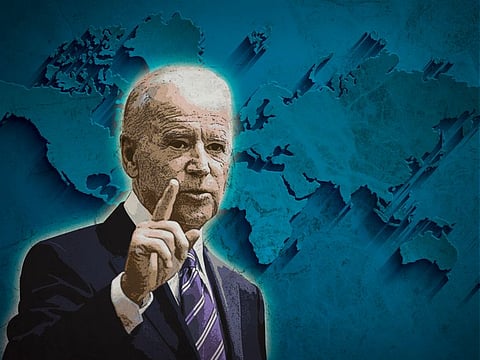Biden says he will not handle US-China relations ‘the way Trump did’
Says will refuse to lift sanctions until Iran commits to stop enriching uranium

Washington: US President Joe Biden said that he would not handle relations between the United States and China “the way Trump did” and that he would refuse to lift sanctions against Iran until its leaders committed to stop enriching uranium, according to his first network interview since taking office.
In a portion of the interview on “CBS Evening News with Norah O’Donnell” that aired Sunday morning, Biden acknowledged he had not yet called Chinese President Xi Jinping but added that “there was no reason not to call him.” He offered Xi some praise but warned that things would be different under the Biden administration.
“He’s very bright. He’s very tough. He doesn’t have - and I don’t mean it as a criticism, just the reality - he doesn’t have a democratic, small D, bone in his body,” Biden said. “I’ve said to him all along that we need not have a conflict. But there’s going to be extreme competition. And I’m not going to do it the way that he knows. And that’s because he’s sending signals, as well. I’m not going to do it the way Trump did. We’re going to focus on international rules of the road.”
Most important relationship
Biden and his officials have indicated a willingness to take a more aggressive posture toward China, while maintaining that it is perhaps the most important relationship for the United States. Shortly after Biden was inaugurated, the Chinese government announced sanctions against more than two dozen outgoing US officials and advisers, which the Biden White House dismissed as an “unproductive and cynical move.”
The president has spoken on the phone with several other world leaders, and Secretary of State Antony Blinken spoke to his Chinese counterpart last week. In a summary of the call, Blinken struck a firm tone, saying he had “made clear the US will defend our national interests, stand up for our democratic values, and hold Beijing accountable for its abuses of the international system.”
Blinken has previously said he believes China is committing genocide against its Uighur people in the Xinjiang region, a declaration that the Trump administration had made in its last days.
Long relationship
As he had frequently on the campaign trail, Biden also noted in his CBS interview that he had a long relationship with Xi from when he was President Barack Obama’s vice president.
“I probably spent more time with Xi Jinping, I’m told, than any world leader has because I had 24, 25 hours of private meetings with him when I was vice president,” Biden told O’Donnell. “Travelled 17,000 miles with him. I know him pretty well.”
In the portion of the interview that aired Sunday, Biden also had a simple response to one of the most pressing foreign policy questions for his new administration.
“No,” he replied, when asked whether the United States would drop sanctions on Iran as a first step toward reviving negotiations.
“They have to stop enriching uranium first?” O’Donnell asked.
Biden nodded his head slowly in the affirmative.
With that, Biden appeared to reject Iranian demands that the United States make the first move to revive the 2015 international nuclear agreement.
Violate commitments
Biden has long said that the ball is in Iran’s court. As a candidate, he pledged that once Tehran stops nuclear activities that violate its commitments under the agreement, the United States would rejoin it. Trump had pulled the United States out of the agreement in 2018, calling it a giveaway to a dangerous and untrustworthy country.
The agreement, the signature foreign policy accomplishment of Obama’s presidency, is largely dormant. Iran’s parliament has set a February 21 deadline for the United States to drop Trump-era sanctions or risk an end to some international inspections of Iranian facilities.
Biden is under pressure from European allies to restore the agreement, but his administration has not committed to any timeline.
There are various proposals to jump-start negotiations or allow a mutual return to the deal by Washington and Tehran.
These include allowing Iran to ease its domestic economic crisis by selling oil, using existing foreign exchange reserves or receiving a coronavirus-related loan from the International Monetary Fund while US sanctions remain in place.
Biden’s top national security aides held their first Iran strategy session on Friday.







